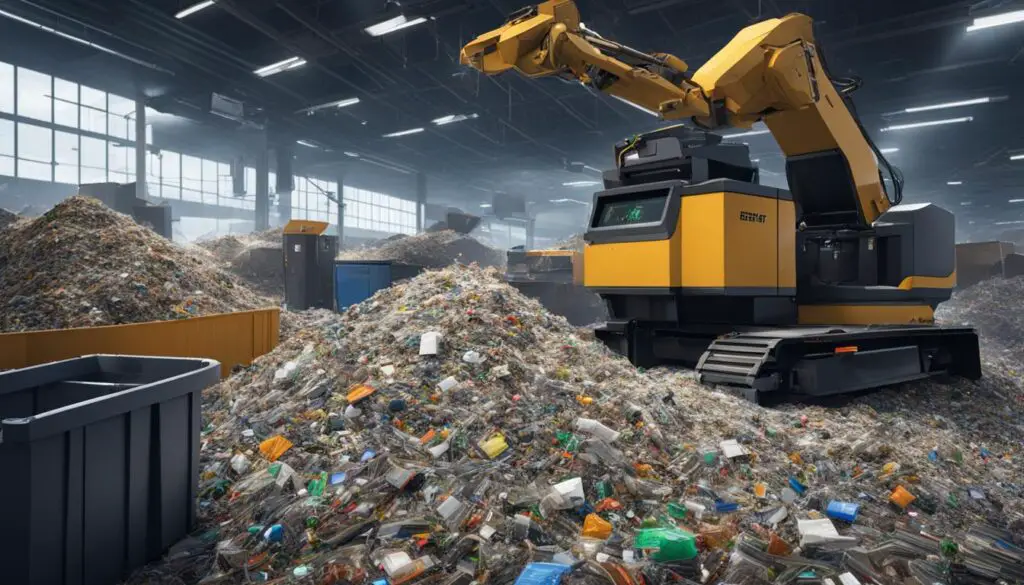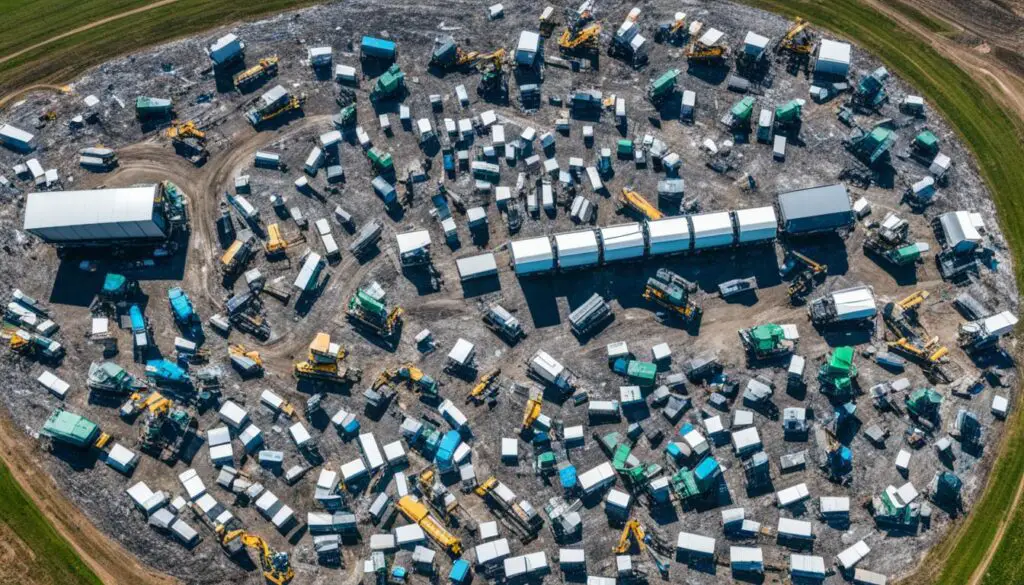
Greetings! In today’s rapidly advancing world, the need for efficient and sustainable waste management practices is more crucial than ever. Fortunately, with the advent of Artificial Intelligence (AI), waste management has been revolutionized, paving the way for a smarter, cleaner future.
AI applications in waste management have the power to transform the industry, improving efficiency and sustainability in the United States. From waste sorting to landfill management, AI is making significant strides in optimizing processes, reducing costs, and minimizing environmental impact. By harnessing the capabilities of AI algorithms and machine learning models, waste management companies are able to make informed decisions, streamline operations, and maximize resource utilization.
Key Takeaways:
- AI in waste management has revolutionized the industry, enhancing efficiency and sustainability.
- AI-powered waste sorting systems improve recycling efficiency and accuracy.
- Landfill management with AI optimizes waste disposal and reduces gas emissions.
- AI enables smarter waste solutions, streamlining processes and reducing environmental impact.
- The future holds great promise for AI advancements in waste management.
AI in Waste Sorting: Improving Recycling Efficiency and Accuracy
AI is playing a pivotal role in waste sorting, enhancing recycling efficiency and accuracy. By leveraging machine learning algorithms, waste management facilities are able to train AI systems to recognize and classify different types of waste materials. This automated process minimizes human error and ensures that recyclable materials are properly sorted and processed, leading to higher recycling rates.
Advanced computer vision technology forms the foundation of AI-powered waste sorting systems. By analyzing images of waste items, these systems can accurately identify the composition of each item, enabling precise segregation into the appropriate categories. Whether it’s plastics, paper, glass, metals, or other recyclable materials, AI ensures that no valuable resources go to waste.
One of the key advantages of AI in waste sorting is its ability to adapt and learn from new waste items. By continuously analyzing and processing data, AI algorithms improve their sorting accuracy over time. This adaptive learning approach enables waste management facilities to stay ahead of evolving waste streams and optimize their recycling processes accordingly.
“AI-powered waste sorting systems automate the process, reduce errors, and improve recycling efficiency. They accurately segregate various waste streams, ensuring valuable resources are properly sorted and processed.”
Through AI in waste sorting, recycling efficiency and accuracy can be greatly enhanced, contributing to a more sustainable waste management system. By maximizing the recovery of recyclable materials, we can reduce the strain on natural resources and minimize the environmental impact of waste disposal.
The Benefits of AI in Waste Sorting:
- Improved recycling rates: AI systems enable accurate segregation of waste streams, leading to higher recycling rates and reduced landfill usage.
- Reduced human error: By automating the sorting process, AI minimizes human error and ensures consistent and reliable sorting of waste materials.
- Adaptive learning: AI algorithms continuously improve their sorting accuracy by adapting and learning from new waste items, leading to more efficient recycling processes.
- Environmental impact reduction: By optimizing waste sorting and recycling, AI helps minimize the environmental impact of waste disposal and contributes to a more sustainable future.

| Benefits | AI in Waste Sorting |
|---|---|
| Improved recycling rates | ✓ |
| Reduced human error | ✓ |
| Adaptive learning | ✓ |
| Environmental impact reduction | ✓ |
AI in Landfill Management: Optimizing Waste Disposal and Gas Emissions
AI technology is revolutionizing landfill management practices, providing innovative solutions for optimizing waste disposal and monitoring gas emissions. By harnessing the power of AI algorithms and data analysis, waste management companies can enhance their efficiency while minimizing the environmental impact of landfills.
One of the key applications of AI in landfill management is optimizing the placement and compaction of waste within landfills. By analyzing data on waste composition, volume, and decay rates, AI models can predict the optimal patterns for waste deposition, maximizing the use of available space and reducing the need for new landfill sites. This not only improves the overall efficiency of waste disposal but also prolongs the lifespan of existing landfills.
Furthermore, AI-based gas emission monitoring systems play a crucial role in mitigating environmental impact. These systems continuously track and measure the levels of methane and other greenhouse gases released from landfills. By providing real-time data and insights, AI helps waste management companies implement proactive measures to reduce gas emissions, minimizing their environmental footprint and improving air quality in surrounding areas.
Implementing AI technologies in landfill management not only optimizes waste disposal but also contributes to overall environmental sustainability. By minimizing the need for new landfill sites, reducing gas emissions, and improving waste management efficiency, AI is playing a vital role in ensuring a cleaner and greener future.

Note: The image above visually represents the potential of AI in transforming landfill management practices, optimizing waste disposal, and reducing environmental impact.
Conclusion
AI applications in waste management have transformed the industry, revolutionizing efficiency, sustainability, and paving the way for smart waste solutions. The power of AI allows waste management companies to optimize waste sorting processes, improving recycling efficiency and reducing environmental impact. By harnessing AI technology, waste managers can achieve more accurate waste segregation, minimizing human error and increasing recycling rates.
AI-powered systems have proven instrumental in optimizing landfill management, making waste disposal more efficient and reducing gas emissions. Through advanced algorithms, waste composition, volume, and decay rates are analyzed to predict optimal waste deposition patterns. This data-driven approach enables informed decision-making around landfill capacity and lifespan, mitigating environmental impact and enhancing air quality in surrounding areas.
The future of waste management is brimming with promise as AI technology continues to advance. The integration of AI solutions offers the potential for a smarter, cleaner world by optimizing waste management processes, improving resource utilization, and minimizing waste generation. By embracing AI in waste management, we move closer to achieving sustainability targets while ensuring a more efficient and responsible approach to dealing with waste.
FAQ
What is AI’s role in waste management?
AI has revolutionized waste management practices in the U.S., leading to increased efficiency and sustainability. It is used in various aspects of waste management, including waste sorting, recycling optimization, landfill management, and waste tracking.
How does AI improve recycling efficiency?
AI is extensively used in waste sorting to improve recycling efficiency and accuracy. Machine learning algorithms are trained to recognize different types of waste materials and sort them into the appropriate categories, ensuring that recyclable materials are properly processed.
How does AI optimize landfill management?
AI technology optimizes landfill management by analyzing data on waste composition, volume, and decay rates. It helps waste management companies make informed decisions about landfill capacity and lifespan, and also monitors gas emissions to reduce environmental impact.
What are the benefits of AI in waste management?
AI applications in waste management revolutionize the industry by increasing efficiency, sustainability, and the development of smart waste solutions. It streamlines processes, reduces costs, improves recycling rates, and minimizes environmental impact, creating a smarter, cleaner future.
Source Links
- https://www.mdpi.com/2075-163X/14/3/265
- https://www.mdpi.com/1424-8220/24/5/1628
- https://www.mdpi.com/1422-0067/25/5/2900








